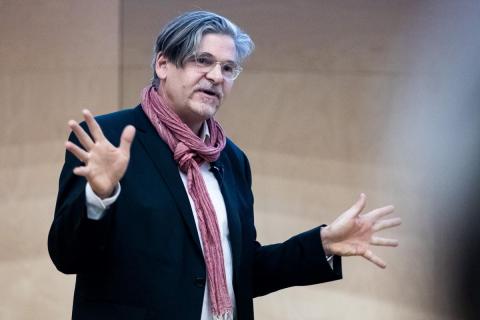Jan-Werner Mueller Gives Lecture on Christian Democracy and Illiberalism

On the 23rd of January Jan-Werner Mueller delivered a lecture which pulled in a full house at IAS and CEU As the Princeton political scientist addressed head-on a pressing issue of today: ‘Is Christian Democracy Illiberal?’ Professor Mueller’s lecture took place as part of the Institute for Advanced Study annual gathering of its Academic Advisory Board.
Renowned for his contributions to political thought --most recently in the hugely influential What is Populism?-- Mueller asks a hardly random question. In some European contexts, the ruling parties explicitly link the notions of ‘illiberalism’ and ‘Christian democracy’ - proclaiming that both mean the same. ‘Not quite’, says Mueller.
Mueller begins his arguments with the highly provocative statement that, ‘historically, Christian democracy is truly illiberal’. Moreover, today we all live in chaos produced largely by Christian democrats who have been the most powerful political force in post-war Europe. Christian democrats laid the foundations for a new, post-war Europe, based on so-called traditional values and were the architects of the ‘illiberal’ welfare states in contexts like Germany and Italy.
The crux of Christian democratic thinking is more complex, argues Mueller, however, tracing the roots of Christian democratic thinking can itself be challenging as there were no founding figures of the doctrine or concisely articulated tenets such as, for instance, a clear-cut conceptual anchor for understanding ‘liberty’.
In the decisive momentum of the French Revolution, Christian democratic thought emerged as an intellectual response to several important dilemmas: how to make democracy and religion safe for each other and how to reduce growing uncertainty without hampering democracy. In Europe, the question ultimately became how can democracy embrace religion and growing religious diversity.
Mueller highlights three strategies that became the guiding ideas for different strands of Christian democratic thinking. The first group of Christian democrats thought along the lines of ‘catholicizing’ liberalism, the second contributed to human rights becoming an important democratic mechanism. The third channeled their aspirations through political parties.
It is the latter that matters the most for a better understanding of the nature of Christian democratic thinking as, Mueller continues, ‘the nature of democracy is that political parties lose’. Even though Christian democratic parties largely disagree with the idea of a pluralist democracy, there are clear differences between Christian democrats and populists or extreme right-wing parties. These differences are not only conceptual but also appear at the level of political practice.
The Christian democratic tradition presupposes an anti-nationalist attitude, and Christian democrats always firmly believed in constraining the nation states in a federal Europe and the also believed in the protection of minority rights. Importantly, Christian democrats never defied Christendom as Christian culture and never tried to separate it from Christianity as such - a move performed by the populists.
